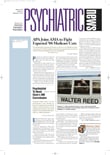Q. I recently joined the Psychiatrists’ Program, the APA-endorsed Professional Liability Insurance Program, and received my first issue of the risk-management newsletter Rx for Risk. I found it quite useful and was wondering if an archive of past articles is available?
A. An online archive of more than 100 psychiatric risk-management articles from Rx for Risk is now available to participants on The Program’s Web site at www.psychprogram.com by logging in to “For Participants Only” to access the new Online Risk Management Library. Finding practical risk management information relevant to your psychiatric practice has never been easier with the addition of a search function and drop-down menus. Articles are also categorized by topic, including forensic issues, records, documentation, confidentiality, and more.
A selection of complimentary risk management articles is also available for nonparticipants in the risk-management section of the Program’s Web site.
Q. My personal digital assistant (PDA) came with free medication information software. I can access a humongous amount of medication information. The program also comes with an alert function that will notify me if I prescribe medications that the patient is allergic to or multiple medications that might interact adversely with one another. Since I treat patients with comorbid, complex somatic illnesses, I’m always worried that medications I prescribe will adversely react with a medication prescribed by the somatic physician. Does using such a product reduce my risk of professional malpractice liability?
A. Using readily available computer software, psychiatrists can access a vast amount of medication information. Computer programs designed to catch potentially adverse medication interactions offer the promise of safer prescribing and do have the potential to reduce malpractice liability risk.
Regardless of this technological revolution, however, the standard of care remains the same. The psychiatrist bears the ultimate responsibility for prescribing appropriately and could be held liable for unreasonable reliance on misinformation or the misuse of accurate information.
The psychiatrist should be comfortable that the information retrieved by computer programs is accurate, complete, and up to date. Due to potential programming errors, the psychiatrist should verify patient medication allergies through medical-record documentation and with the patient rather than relying solely on the computer program’s alert function. For patients in treatment with multiple providers for comorbid illnesses, the risk of adverse medication interaction is, of course, greatly increased. Medication-interaction programs offer a great safety net and can thereby improve patient care. The computer program cannot, however, alert the psychiatrist to a potential interaction if the psychiatrist is unaware of a medication prescribed or dosage altered by another provider.
For this reason, communication among treatment providers is the primary risk-management approach to preventing adverse medication interactions. All treatment providers should obtain patient consent and communicate with each other. The psychiatrist can then discuss with the physician(s) treating the somatic conditions the patient’s medications and potential interactions, overall treatment plan, and clinically significant events.
Medication information programs offer a safety net that can lead to safer prescribing and treatment. If you are so inclined, use them. The technology, however, is only one aspect of safe prescribing. The treating psychiatrist’s expertise and professional judgment are what ultimately count.
Q. I am a Program participant and need to obtain a certificate of insurance. What is the quickest and easiest way to request a certificate?
A. To facilitate requests such as for a certificate of insurance, we recently established a new 24-hour Program Customer Care Line at (800) 245-3333, ext. 332. Just follow the automated instructions and a certificate will be sent within two business days after the request is received. Participants can also call this toll-free line to follow up on recent payments or check on renewal policy status. You can also e-mail your requests or questions at
[email protected].
This column is provided by PRMS, manager of the Psychiatrists’ Program, for the benefit of members. More information is available by visiting the Program’s Web site at www.psychprogram.com; calling (800) 245-3333, ext. 389; or sending an e-mail to [email protected]. ▪
